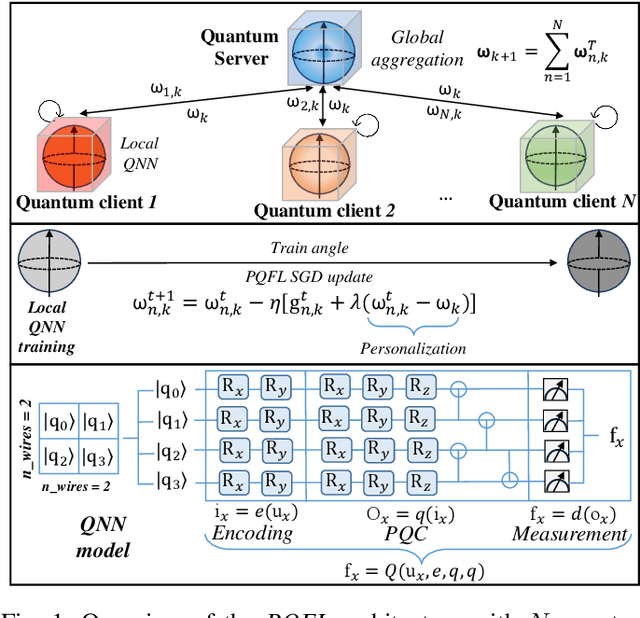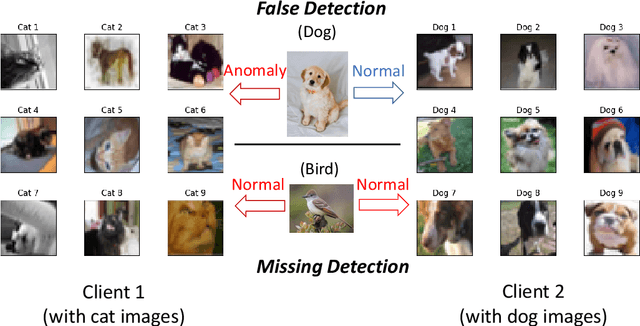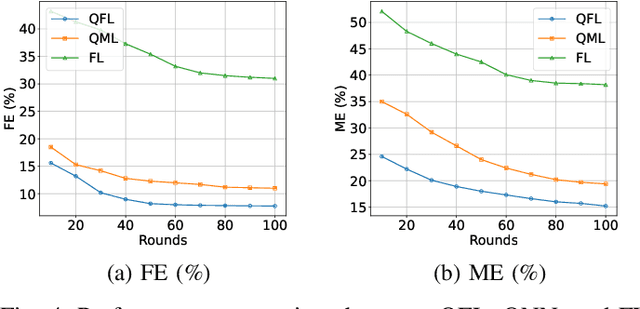Ratun Rahman
Tackling Heterogeneity in Quantum Federated Learning: An Integrated Sporadic-Personalized Approach
Jan 11, 2026Abstract:Quantum federated learning (QFL) emerges as a powerful technique that combines quantum computing with federated learning to efficiently process complex data across distributed quantum devices while ensuring data privacy in quantum networks. Despite recent research efforts, existing QFL frameworks struggle to achieve optimal model training performance primarily due to inherent heterogeneity in terms of (i) quantum noise where current quantum devices are subject to varying levels of noise due to varying device quality and susceptibility to quantum decoherence, and (ii) heterogeneous data distributions where data across participating quantum devices are naturally non-independent and identically distributed (non-IID). To address these challenges, we propose a novel integrated sporadic-personalized approach called SPQFL that simultaneously handles quantum noise and data heterogeneity in a single QFL framework. It is featured in two key aspects: (i) for quantum noise heterogeneity, we introduce a notion of sporadic learning to tackle quantum noise heterogeneity across quantum devices, and (ii) for quantum data heterogeneity, we implement personalized learning through model regularization to mitigate overfitting during local training on non-IID quantum data distributions, thereby enhancing the convergence of the global model. Moreover, we conduct a rigorous convergence analysis for the proposed SPQFL framework, with both sporadic and personalized learning considerations. Theoretical findings reveal that the upper bound of the SPQFL algorithm is strongly influenced by both the number of quantum devices and the number of quantum noise measurements. Extensive simulation results in real-world datasets also illustrate that the proposed SPQFL approach yields significant improvements in terms of training performance and convergence stability compared to the state-of-the-art methods.
Towards Personalized Quantum Federated Learning for Anomaly Detection
Nov 08, 2025



Abstract:Anomaly detection has a significant impact on applications such as video surveillance, medical diagnostics, and industrial monitoring, where anomalies frequently depend on context and anomaly-labeled data are limited. Quantum federated learning (QFL) overcomes these concerns by distributing model training among several quantum clients, consequently eliminating the requirement for centralized quantum storage and processing. However, in real-life quantum networks, clients frequently differ in terms of hardware capabilities, circuit designs, noise levels, and how classical data is encoded or preprocessed into quantum states. These differences create inherent heterogeneity across clients - not just in their data distributions, but also in their quantum processing behaviors. As a result, training a single global model becomes ineffective, especially when clients handle imbalanced or non-identically distributed (non-IID) data. To address this, we propose a new framework called personalized quantum federated learning (PQFL) for anomaly detection. PQFL enhances local model training at quantum clients using parameterized quantum circuits and classical optimizers, while introducing a quantum-centric personalization strategy that adapts each client's model to its own hardware characteristics and data representation. Extensive experiments show that PQFL significantly improves anomaly detection accuracy under diverse and realistic conditions. Compared to state-of-the-art methods, PQFL reduces false errors by up to 23%, and achieves gains of 24.2% in AUROC and 20.5% in AUPR, highlighting its effectiveness and scalability in practical quantum federated settings.
SimQFL: A Quantum Federated Learning Simulator with Real-Time Visualization
Aug 17, 2025Abstract:Quantum federated learning (QFL) is an emerging field that has the potential to revolutionize computation by taking advantage of quantum physics concepts in a distributed machine learning (ML) environment. However, the majority of available quantum simulators are primarily built for general quantum circuit simulation and do not include integrated support for machine learning tasks such as training, evaluation, and iterative optimization. Furthermore, designing and assessing quantum learning algorithms is still a difficult and resource-intensive task. Real-time updates are essential for observing model convergence, debugging quantum circuits, and making conscious choices during training with the use of limited resources. Furthermore, most current simulators fail to support the integration of user-specific data for training purposes, undermining the main purpose of using a simulator. In this study, we introduce SimQFL, a customized simulator that simplifies and accelerates QFL experiments in quantum network applications. SimQFL supports real-time, epoch-wise output development and visualization, allowing researchers to monitor the process of learning across each training round. Furthermore, SimQFL offers an intuitive and visually appealing interface that facilitates ease of use and seamless execution. Users can customize key variables such as the number of epochs, learning rates, number of clients, and quantum hyperparameters such as qubits and quantum layers, making the simulator suitable for various QFL applications. The system gives immediate feedback following each epoch by showing intermediate outcomes and dynamically illustrating learning curves. SimQFL is a practical and interactive platform enabling academics and developers to prototype, analyze, and tune quantum neural networks with greater transparency and control in distributed quantum networks.
Brain Tumor Detection in MRI Based on Federated Learning with YOLOv11
Mar 06, 2025Abstract:One of the primary challenges in medical diagnostics is the accurate and efficient use of magnetic resonance imaging (MRI) for the detection of brain tumors. But the current machine learning (ML) approaches have two major limitations, data privacy and high latency. To solve the problem, in this work we propose a federated learning architecture for a better accurate brain tumor detection incorporating the YOLOv11 algorithm. In contrast to earlier methods of centralized learning, our federated learning approach protects the underlying medical data while supporting cooperative deep learning model training across multiple institutions. To allow the YOLOv11 model to locate and identify tumor areas, we adjust it to handle MRI data. To ensure robustness and generalizability, the model is trained and tested on a wide range of MRI data collected from several anonymous medical facilities. The results indicate that our method significantly maintains higher accuracy than conventional approaches.
Electrical Load Forecasting over Multihop Smart Metering Networks with Federated Learning
Feb 24, 2025Abstract:Electric load forecasting is essential for power management and stability in smart grids. This is mainly achieved via advanced metering infrastructure, where smart meters (SMs) record household energy data. Traditional machine learning (ML) methods are often employed for load forecasting but require data sharing which raises data privacy concerns. Federated learning (FL) can address this issue by running distributed ML models at local SMs without data exchange. However, current FL-based approaches struggle to achieve efficient load forecasting due to imbalanced data distribution across heterogeneous SMs. This paper presents a novel personalized federated learning (PFL) method for high-quality load forecasting in metering networks. A meta-learning-based strategy is developed to address data heterogeneity at local SMs in the collaborative training of local load forecasting models. Moreover, to minimize the load forecasting delays in our PFL model, we study a new latency optimization problem based on optimal resource allocation at SMs. A theoretical convergence analysis is also conducted to provide insights into FL design for federated load forecasting. Extensive simulations from real-world datasets show that our method outperforms existing approaches in terms of better load forecasting and reduced operational latency costs.
Electrical Load Forecasting in Smart Grid: A Personalized Federated Learning Approach
Nov 15, 2024



Abstract:Electric load forecasting is essential for power management and stability in smart grids. This is mainly achieved via advanced metering infrastructure, where smart meters (SMs) are used to record household energy consumption. Traditional machine learning (ML) methods are often employed for load forecasting but require data sharing which raises data privacy concerns. Federated learning (FL) can address this issue by running distributed ML models at local SMs without data exchange. However, current FL-based approaches struggle to achieve efficient load forecasting due to imbalanced data distribution across heterogeneous SMs. This paper presents a novel personalized federated learning (PFL) method to load prediction under non-independent and identically distributed (non-IID) metering data settings. Specifically, we introduce meta-learning, where the learning rates are manipulated using the meta-learning idea to maximize the gradient for each client in each global round. Clients with varying processing capacities, data sizes, and batch sizes can participate in global model aggregation and improve their local load forecasting via personalized learning. Simulation results show that our approach outperforms state-of-the-art ML and FL methods in terms of better load forecasting accuracy.
False Data Injection Attack Detection in Edge-based Smart Metering Networks with Federated Learning
Nov 02, 2024Abstract:Smart metering networks are increasingly susceptible to cyber threats, where false data injection (FDI) appears as a critical attack. Data-driven-based machine learning (ML) methods have shown immense benefits in detecting FDI attacks via data learning and prediction abilities. Literature works have mostly focused on centralized learning and deploying FDI attack detection models at the control center, which requires data collection from local utilities like meters and transformers. However, this data sharing may raise privacy concerns due to the potential disclosure of household information like energy usage patterns. This paper proposes a new privacy-preserved FDI attack detection by developing an efficient federated learning (FL) framework in the smart meter network with edge computing. Distributed edge servers located at the network edge run an ML-based FDI attack detection model and share the trained model with the grid operator, aiming to build a strong FDI attack detection model without data sharing. Simulation results demonstrate the efficiency of our proposed FL method over the conventional method without collaboration.
 Add to Chrome
Add to Chrome Add to Firefox
Add to Firefox Add to Edge
Add to Edge